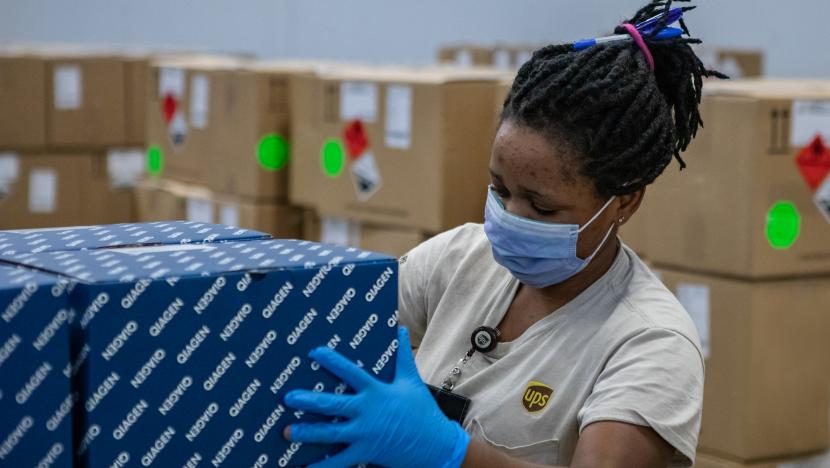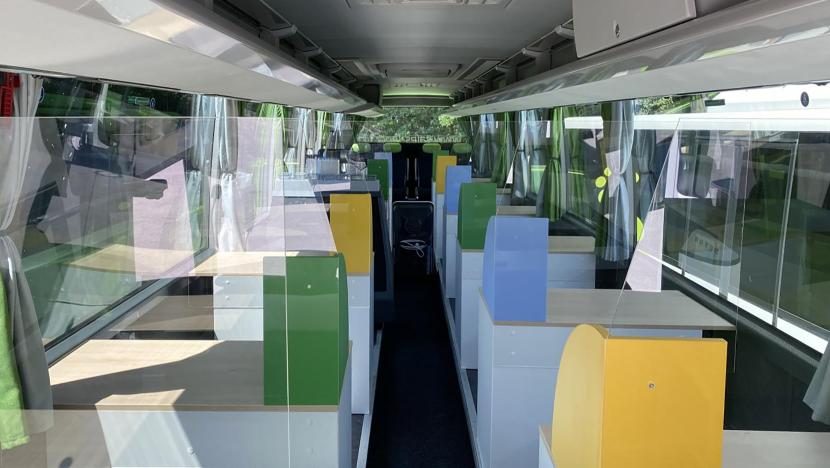
Like many industries, commercial road transport was seriously affected by the Covid-19 pandemic. Nevertheless, operators and their employees stepped up to the plate and their actions have been widely praised.
Even with operations significantly reduced, or in certain cases at a complete standstill, some businesses have been offering special services to the most vulnerable members of society.
The IRU looks back at a few examples of companies from its community that have been going the extra mile amidst the crisis.
Lifesaving support
Globally, goods road transport companies are forecasted to sustain losses of more than €550 billion in 2020. European passenger transport is facing losses of €80 billion. Despite this looming financial adversity, drivers are working hard to ensure that food, medical supplies and passengers safely reach their destinations.
UPS is no exception. In response to the pandemic, the company‘s subsidiary UPS Healthcare, which recently doubled its clinical trial material storage and distribution facility in Frankfurt, Germany, is providing the timely and safe delivery of medical supplies around the globe. UPS drivers deliver personal protective equipment, test kits, ventilators and medication.

UPS employee with mask and gloves during pandemic.
“I am proud of the important role this company is playing in the battle against the Coronavirus. We will continue to do our part by deploying our capabilities in unprecedented ways until this pandemic is behind us,” said Wes Wheeler, president of UPS Healthcare
Adapting to community needs
Passenger transport was hit particularly hard by lockdown measures. Revenues fell by 80% for scheduled intercity services and up to 100% for tourist and cross-border coach services. Passenger transport workers and enterprises responded with innovation and efficiency.
In Spain, authorities responded to the high Covid-19 mortality rate by converting hotels into healthcare facilities for recovering patients. However, there was a severe shortage of logistical capacity for patient transport.
ALSA, a leading passenger transport operator in Spain, helped to meet this challenge by providing buses to the Military Emergency Unit and adapting their vehicles to patient needs. ALSA assisted with the transport of hundreds of Covid-19 patients to six medical units throughout Spain.
“We are delighted to support the commendable work carried out by the Military Emergency Unit in the fight against this pandemic. As we did for the Ministry of Health and the Community of Madrid, ALSA is pleased to contribute technical and human resources to win the battle against Covid-19,” said Francisco Iglesias, CEO of ALSA.
Swapping tourists for students
Commercial road transport has also been playing an active role during the recovery period, as communities adjust to the ‘new normal‘ of social distancing. Sales-Lentz, a passenger transport operator and member of the Luxembourg Federation of Bus and Coach Operators (FLEAA), adapted its fleet to provide innovative ways to comply with health measures.
Due to social distancing rules in Luxembourg, some students were not able to attend school. Sales-Lentz lent a hand by converting one of its tourism coaches into a classroom for 10 students and their teacher. The bus was equipped with small desks with Plexiglas dividers and school chairs.
Particularly vulnerable, the elderly were isolated from their families during the pandemic. As the lockdown came to an end, some retirement homes were not equipped to welcome visitors in line with health measures. Sales-Lentz installed a Plexiglas divider in one of its buses to create a space where visits with family members could take place without constraints.

Tourism coach converted into a classroom for ten students and their teacher during Covid-19 pandemic.
“In these uncertain times, we are proud to develop innovations, such as the school bus or a minivan visiting space, that really benefit society and show how close we are to the population,” said Jos Sales, associate partner at Sales-Lentz.
The pandemic revealed the central role that road transport plays in our daily lives with transport operators and their employees providing invaluable support. Governments now need to ensure adequate financial support for the freight and passenger road transport sectors so they can keep working to alleviate the economic impact of Covid-19.




